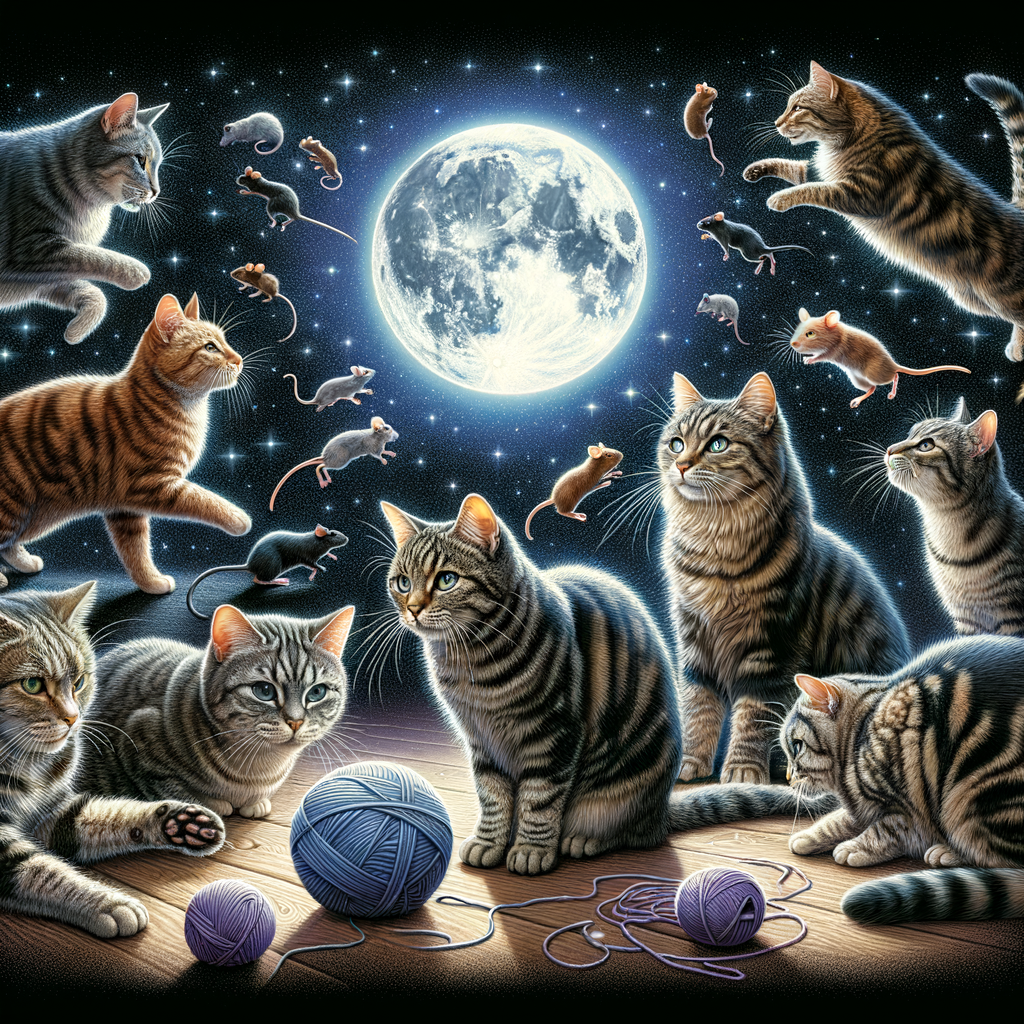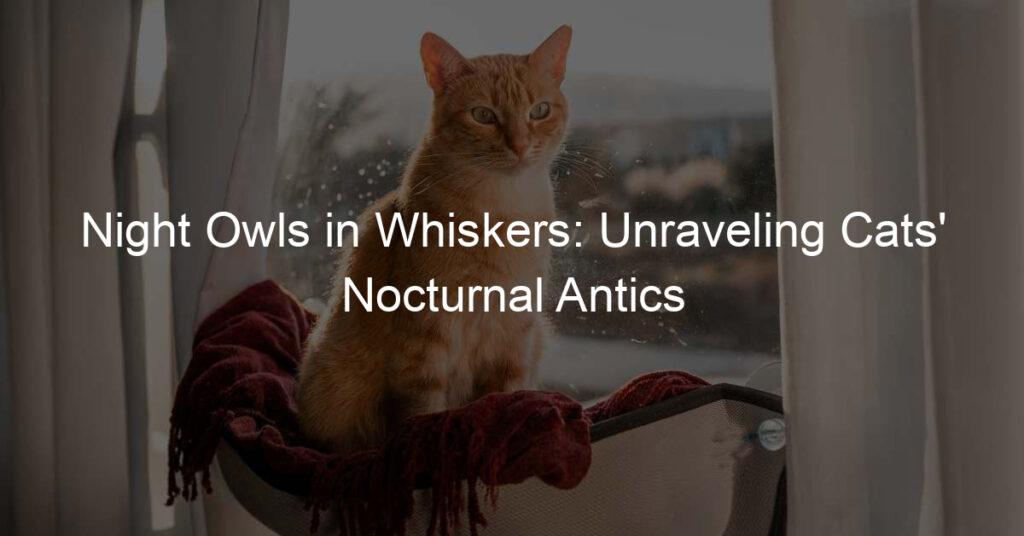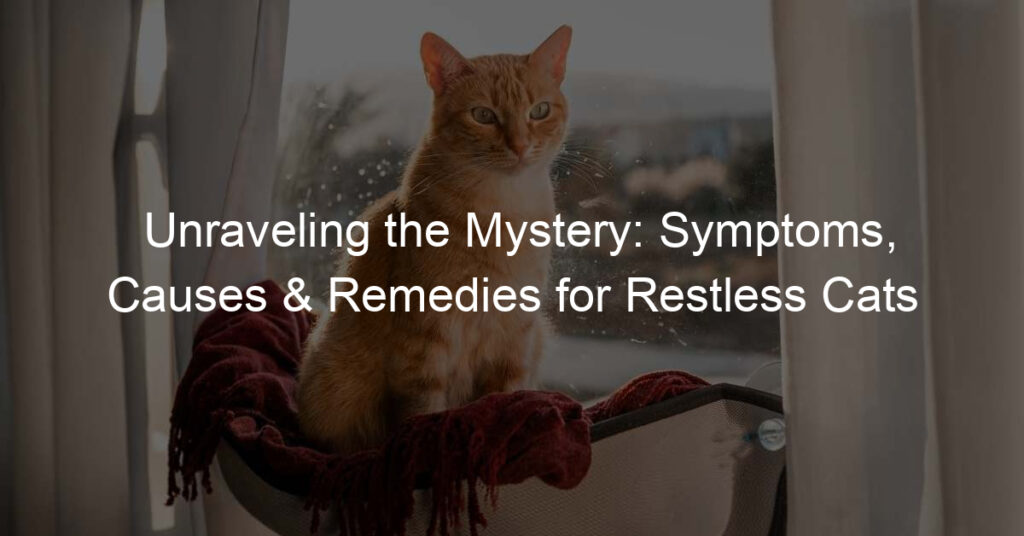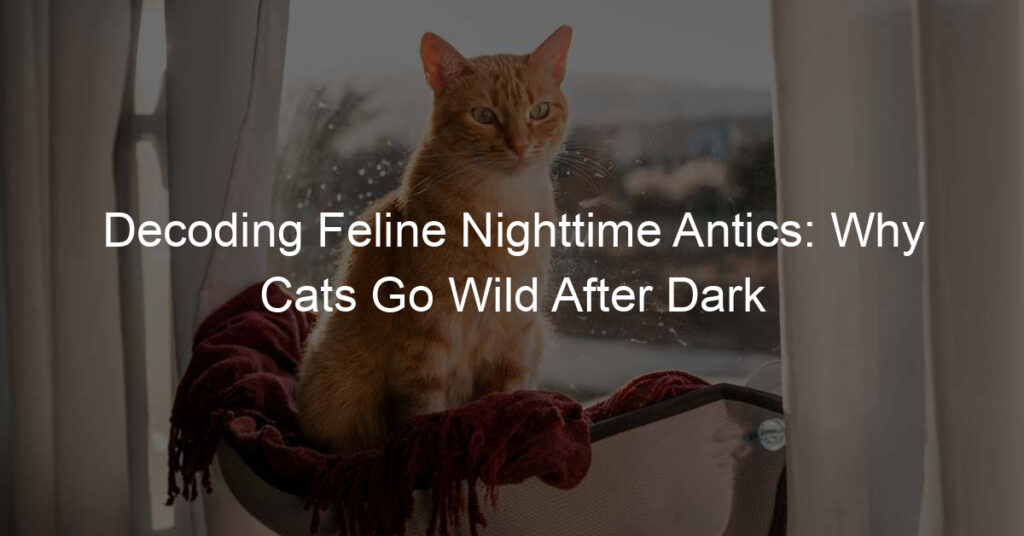
Introduction to Cats’ Nocturnal Behavior
Have you ever wondered why your feline friend seems to be most active when you’re ready for bed? This is due to their nocturnal behavior. In this section, we will delve into understanding why cats are nocturnal creatures and the instinct that drives this behavior.
- Overview of cats as nocturnal creatures
- Understanding cat behavior: The nocturnal instinct
Cats, especially domestic ones, are known for their unique behavior of being active during the night. This behavior is not just a random preference; it’s rooted in their biology and history. Cats belong to a class of animals known as ‘crepuscular’ creatures, which means they are most active during the twilight hours of dawn and dusk.
This behavior can be traced back to their wild ancestors, who found these times most advantageous for hunting. The low light levels helped them to hide from their prey and also from larger predators. While your domestic cat may not need to hunt for survival, this instinctive behavior remains.
The nocturnal instinct in cats is something that has been passed down from generation to generation. It’s an inherent part of their nature. Even though domestic cats have been living with humans for thousands of years, this instinct is still strong.
During the night, cats exhibit behaviors such as hunting, exploring, and playing. These are all activities that would typically take place in the wild. So, when your cat is darting around the house at night, it’s just them expressing their natural instincts.
In the following sections, we will explore more about why cats are active at night, whether it’s normal, and how you can adapt to your cat’s nocturnal lifestyle. Understanding these behaviors can help you better care for your feline friend and appreciate their unique traits.
Why Cats are Active at Night
Have you ever wondered why your feline friend seems to come alive just when you’re getting ready for bed? There are two main reasons why cats are more active at night: evolutionary factors and their hunting instincts. Let’s delve into these reasons to understand our feline friends better.
- Evolutionary Reasons for Cats Being Active at Night
- The Influence of Hunting Instincts on Cat’s Night Activity
Cats, like many other animals, have evolved over thousands of years to adapt to their environment and increase their chances of survival. In the wild, cats are primarily solitary animals. They have developed a pattern of being active during the night to avoid larger predators that are typically active during the day. This nocturnal behavior has been passed down through generations, and even domesticated cats retain this instinct.
Another reason why cats are active at night is due to their hunting instincts. Cats are natural predators. In the wild, they hunt for food, and their primary targets are small creatures like rodents and birds, which are most active during dusk and dawn. This is known as being crepuscular. Even though your house cat might not need to hunt for its food, it still retains this instinct. This is why you might find your cat becoming more active and playful during the night.
Understanding these reasons can help us better accommodate our cats’ nocturnal habits and create a more harmonious living environment. Remember, your cat’s nighttime antics are a normal part of their behavior and a testament to their fascinating evolutionary history.
Is it Normal for Cats to be Active at Night?
Have you ever wondered why your feline friend seems to come alive when the sun goes down? If so, you’re not alone. Many cat owners find themselves puzzled by their pets’ nocturnal antics. In this section, we will explore whether it is normal for cats to be active at night, and delve into the typical nighttime habits of domestic cats.
- Exploring the normalcy of cat’s night time activity
- Case study: Typical nighttime habits of domestic cats
It is completely normal for cats to be active at night. Cats are crepuscular animals, which means they are most active during the twilight hours of dawn and dusk. This behavior is a survival instinct that has been passed down from their wild ancestors who hunted during these hours to avoid larger predators that were active during the day.
While domestic cats no longer need to hunt for their food, they still retain this instinctual behavior. So, if your cat seems to be more active at night, rest assured that it is a normal part of their nature.
Let’s take a look at a case study to better understand the typical nighttime habits of domestic cats. A study conducted by the University of Georgia attached cameras to 60 cats and followed their activities for a week. The results showed that the cats were most active between 9 PM and the early hours of the morning.
During these hours, the cats exhibited behaviors such as hunting, exploring, and playing. This study confirms that it is indeed normal for cats to be active at night, and that their nighttime behaviors are largely influenced by their natural instincts.
In conclusion, if your cat is keeping you up at night with their antics, remember that they are simply following their natural instincts. While it might be inconvenient for us, it’s completely normal for them. In the next section, we will explore how you can adapt to your cat’s nocturnal lifestyle.
Understanding Cat Behavior: Nighttime Habits
As a cat owner, you might have noticed that your feline friend is more active during the night. This is a common characteristic of cats, and understanding their nighttime habits can help you better cater to their needs and behaviors.
Common Nighttime Activities of Cats
Cats engage in a variety of activities during the night. Here are some of the most common ones:
- Exploring: Cats are naturally curious creatures. At night, they often take advantage of the quiet to explore their surroundings. This could involve investigating new objects or areas in the house, or simply roaming around their familiar territory.
- Hunting: Despite being domesticated, cats still retain their primal hunting instincts. Even if they are well-fed, cats may engage in hunting-like behavior at night. This could involve stalking and pouncing on toys, or even small insects.
- Playing: Cats are playful animals, and they often reserve their energy for bouts of play during the night. This could involve chasing toys, wrestling with other pets, or even playing with household objects.
Understanding these common nighttime activities can help you better understand your cat’s behavior and needs. Remember, each cat is unique and may have its own set of preferred nighttime activities. Observing your cat’s behavior can provide valuable insights into their preferences and habits.
How to Interpret Your Cat’s Nighttime Behavior
Understanding your cat’s nighttime behavior can be a fascinating journey. Cats are naturally nocturnal creatures, and their nighttime antics can tell you a lot about their health, happiness, and overall well-being. Here, we will delve into how to interpret your cat’s nighttime behavior, focusing on understanding the signs and key takeaways.
- Understanding the signs: What is your cat trying to tell you?
- Key takeaways for interpreting cat behavior at night
When it comes to interpreting your cat’s behavior, it’s crucial to pay attention to the signs. Cats communicate through a variety of signals, including their body language, vocalizations, and actions. For instance, if your cat is excessively active at night, it might be a sign of boredom or stress. On the other hand, a cat that is unusually quiet or inactive might be feeling unwell. It’s important to observe these signs and respond appropriately to ensure your cat’s well-being.
Interpreting your cat’s nighttime behavior can provide valuable insights into their needs and preferences. Here are some key takeaways:
| Behavior | Interpretation |
|---|---|
| Excessive activity | Possible boredom or stress |
| Unusual quietness or inactivity | Possible illness |
| Aggressive play | Possible need for more playtime during the day |
| Excessive meowing | Possible need for attention or food |
Remember, each cat is unique and may display different behaviors. The key is to observe, understand, and respond to your cat’s signals to ensure they are happy and healthy.
How to Adapt to Your Cat’s Nocturnal Lifestyle
Adapting to your cat’s nocturnal lifestyle can be a bit of a challenge, especially if you’re a light sleeper. However, with a few tips and tricks, you can manage your cat’s night activity and ensure their nocturnal instincts don’t disrupt your sleep.
- Tips for managing your cat’s night activity
- Play with your cat during the day: Keeping your cat active during the day can help reduce their energy levels at night. Try to engage them in play sessions throughout the day, particularly in the late afternoon or early evening.
- Feed your cat before bedtime: Feeding your cat a small meal before you go to bed can make them feel sleepy, as cats tend to sleep after a good meal.
- Provide a comfortable sleeping area: Make sure your cat has a comfortable and quiet place to sleep. This can encourage them to rest more during the night.
- How to ensure your cat’s nocturnal instincts don’t disrupt your sleep
- Use white noise: A white noise machine can help drown out any noise your cat makes during the night, helping you to sleep better.
- Keep your bedroom door closed: If your cat’s activity is particularly disruptive, you may want to consider keeping them out of your bedroom at night.
- Be consistent: Cats are creatures of habit. Stick to a consistent routine for feeding, playtime, and bedtime to help regulate your cat’s internal clock.
Firstly, it’s important to understand that your cat’s nocturnal activity is a natural instinct and not a sign of misbehavior. Here are a few tips to help manage your cat’s night activity:
Even with the best management strategies, your cat may still have periods of activity during the night. Here’s how you can ensure your sleep isn’t disrupted:
Remember, adapting to your cat’s nocturnal lifestyle takes time and patience. But with these tips, you can ensure a peaceful coexistence with your feline friend, even during the night.
Conclusion: Embracing Your Cat’s Nocturnal Antics
As we conclude this enlightening journey into the nocturnal world of our feline friends, it’s essential to remember that every cat is unique. Their nighttime activities, while sometimes puzzling or even frustrating, are a part of their natural behavior. Embracing these antics can lead to a deeper understanding and appreciation of your cat’s individual personality.
- Appreciating the uniqueness of cat behavior at night
Each cat has its own set of behaviors that it exhibits during the night. Some might enjoy a midnight play session, while others prefer to spend their nights exploring every nook and cranny of your home. These behaviors are a testament to the curiosity and independence that make cats such fascinating companions.
Remember, these nocturnal antics are not a sign of misbehavior, but rather an expression of their natural instincts. By appreciating these behaviors, we can better understand our cats and create an environment where they feel safe and stimulated, even in the wee hours of the night.
- Final thoughts on understanding and adapting to your cat’s nocturnal behavior
Understanding your cat’s nocturnal behavior is the first step towards creating a harmonious living environment for both of you. Cats are naturally active at night, and trying to change this behavior can lead to stress and anxiety for your furry friend.
Instead of trying to alter their natural behavior, consider adapting your lifestyle to accommodate their nocturnal habits. This might mean providing them with safe and engaging toys to play with at night or setting up a cozy sleeping area where they can rest during the day.
In conclusion, embracing your cat’s nocturnal antics is about more than just tolerating their late-night activities. It’s about appreciating the unique behaviors that make your cat who they are and finding ways to adapt your lifestyle to ensure their happiness and well-being.








